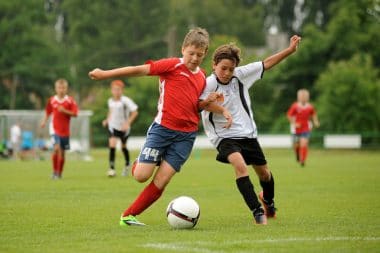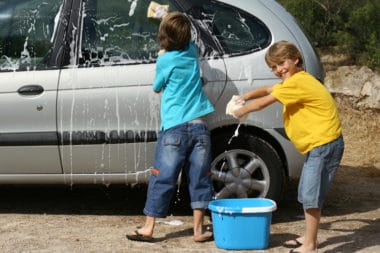It is no fun to endure your child screaming, yelling, throwing a tantrum or crying. Especially if this is the results after playing a game with your child and they have lost. No one likes to lose, but becoming a gracious loser is an important attribute that we have to teach our children.Â
Learning how to lose does not come naturally. It is a skill that has to be taught and learned. It can be easily taught just through your child watching how you handle losing.Â
If your child decides to quit a game before it ends or try to change the rules of the game during playing, this may be a case of them not knowing how to lose well. Other signs are yelling or pouting after a lost, or even being angry and saying mean things to the winner. It isn’t fun to play with your kids when they act like that, and if they act like that with friends, the friends may not come around as much anymore.Â
So what do we do about kids that can’t lose? If they don’t learn it early is it too late?Â
The good news is learning to lose can happen at any time. The bad news is there are even some adults who don’t know how to lose and if you have one of those in your family too, it may be harder to teach good behavior.Â
If your child is a preschooler it may be too young to help with learning good losing skills. At this age the child is still making up rules to games and learning how to play. The best age to start learning gracious losing is at grade school level. You can still show your children by example at any age how to lose well.Â
Learning how to accept defeat is a good skill for all people to work on. This helps our children grow up to learn how to handle defeat in all other aspects in life not just in playing games. Don’t try to take out all the competition in games, some competition is good, it helps drive children and make them be motivated. Learning how to win graciously is just as good as learning to lose graciously.
A good thing to keep in mind when teaching your children to play is to not let them win all the time. It may be easier to skip the pout and the yelling but it isn’t doing anyone any favors in the long run. When they lose and they throw a tantrum ignore it. Pick up the game and move on. After they have calmed down you can talk to them about losing. You can tell them that anger and sadness with a loss is ok, but it isn’t ok to act out with those feelings.Â
Help teach them ways to cope with these emotions in a positive way. Whether that’s taking a deep breath after a loss or whether they need a good job after a loss to help boost their moods up. If they are hateful after a loss make sure they know it is not ok behavior. Teach them what to say to others, such as “good game” to the other people they are playing with or to help them give a compliment after each game played.Â
Give pep talks while you play games with your children. Encourage them during play and after what they did well. Don’t just focus on the outcome of the game but you can talk about what they did during the game that was so good. Or that they improved on from the last time you played. Praise them for their efforts and doing their best. If your child is playing with other children try not to compare them to others. Â
Children learn from watching. They learn so much from our actions. Help by setting a good example for your kids. Be a gracious loser and winner when you play.Â
If your children just can’t deal with losing and it keeps making play hard. Switch to cooperative games where everyone works together. That way it gives you all a break from the competition.Â
Don’t expect change overnight. It takes time to learn something new. And learning to lose is a skill. If you are losing patience, take a break from games altogether for a bit. Play and games are meant to be fun when one or more people aren’t having fun it is no longer considered play. Practice and more practice, make sure you always praise good behavior and ignore unwanted behavior. Â
Have a sore loser in your family? Find tips here to overcoming this bad habit! #HealthStatus
Learning how to accept defeat is a good skill for all people to work on.Â
Sources:
https://www.babycenter.com/
https://www.verywellfamily.com/
https://www.americanenvironics.com/









Reply